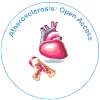Advancing Therapeutic Frontiers in Atherosclerosis: Navigating Cellular Heterogeneity, Immune Mechanisms, and Metabolic Adaptations for Targeted Interventions
Received Date: Jan 01, 2024 / Accepted Date: Jan 29, 2024 / Published Date: Jan 30, 2024
Abstract
Atherosclerosis, a chronic inflammatory disease of the arterial walls, is characterized by intricate cellular heterogeneity within the plaques. The identification of highly plastic and heterogeneous cell populations has added a layer of complexity to atherosclerosis research, challenging traditional cell markers used for plaque analysis. To overcome this, advanced techniques such as lineage tracing and single-cell omics have emerged, enabling a deeper understanding of different cell subsets and their functional roles. Moreover, technological advancements in lipidomics and metabolomics have provided insights into the molecular landscape of atherosclerosis, shedding light on metabolic adaptations and cellular plasticity in diseased arteries. These approaches hold potential for developing antigen-specific therapies by elucidating the adaptive immune response and identifying specific targets for intervention. The need for innovative therapeutic strategies is evident, as investment in cardiovascular drug development has lagged behind other areas of research. Targeting inflammatory responses driven by impaired immune cell activation is a promising avenue, either by focusing on specific immune cell subsets or their effectors. Additionally, site-specific therapies and timingoptimized strategies may enhance drug efficacy while minimizing side effects. Identifying key regulatory pathways controlling the phenotypic modulation of endothelial cells and vascular smooth muscle cells could pave the way for converting them into atheroprotective phenotypes. Furthermore, the integration of spatial omics techniques, protein profiling, and Mendelian randomization can provide valuable insights into the adaptive immune response, antigenspecific targets, and the potential effectiveness of pharmacological modifications. These multidimensional approaches offer the potential for personalized and targeted therapies against atherosclerosis. In conclusion, a comprehensive understanding of cellular heterogeneity, immune mechanisms, and metabolic adaptations in atherosclerosis is essential for the development of innovative therapeutic interventions. By unraveling the complexities of this disease, we can pave the way for precision medicine and improved management of atherosclerosis, thus alleviating the global burden of cardiovascular disease.
Citation: Stewart C (2024) Advancing Therapeutic Frontiers in Atherosclerosis:Navigating Cellular Heterogeneity, Immune Mechanisms, and MetabolicAdaptations for Targeted Interventions. Atheroscler Open Access 9: 246.
Copyright: © 2024 Stewart C. This is an open-access article distributed under theterms of the Creative Commons Attribution License, which permits unrestricteduse, distribution, and reproduction in any medium, provided the original author andsource are credited.
Share This Article
Open Access Journals
Article Usage
- Total views: 744
- [From(publication date): 0-2024 - Mar 31, 2025]
- Breakdown by view type
- HTML page views: 555
- PDF downloads: 189
